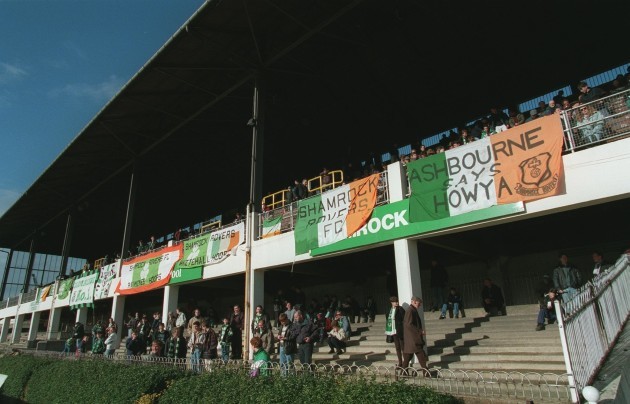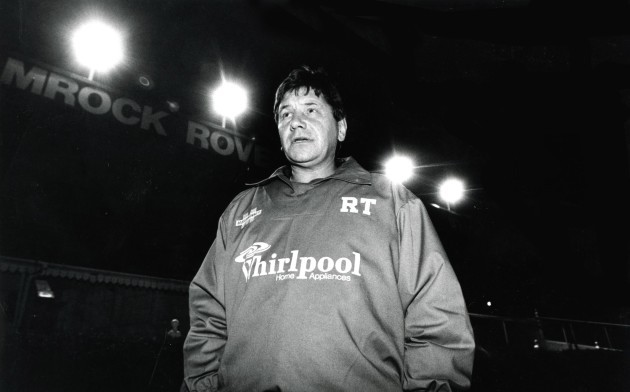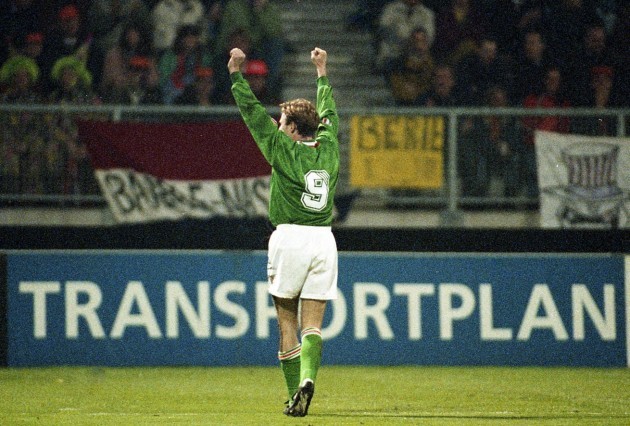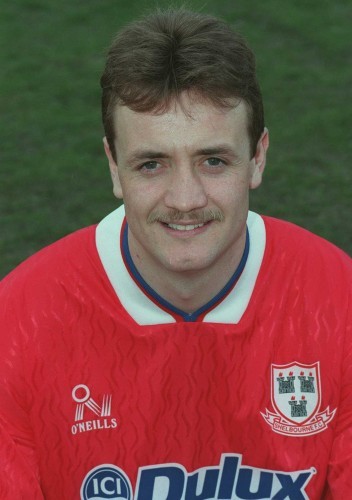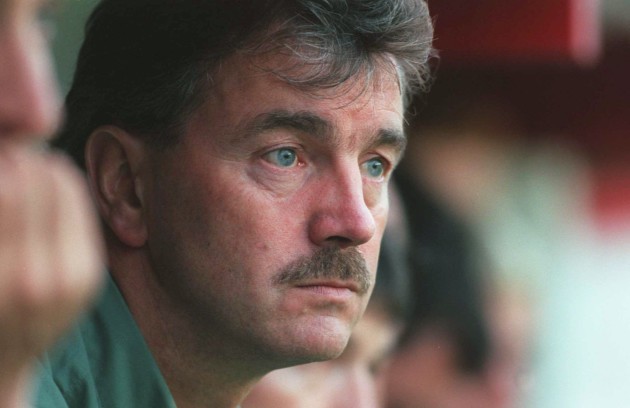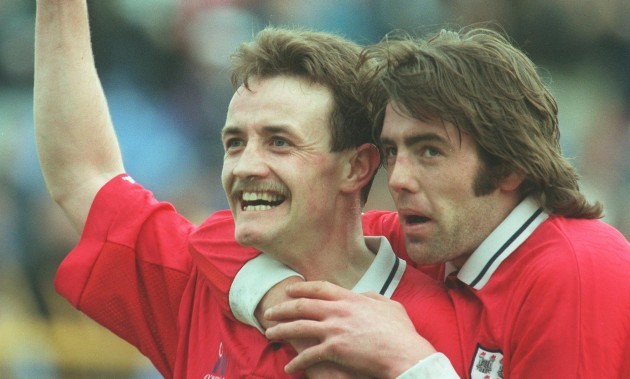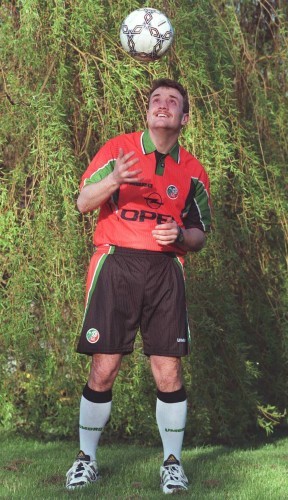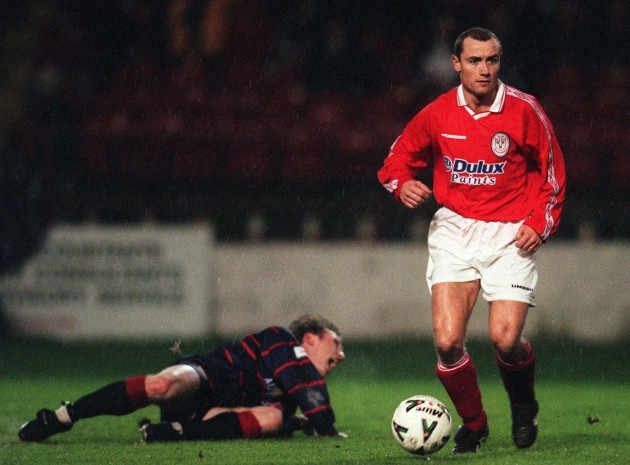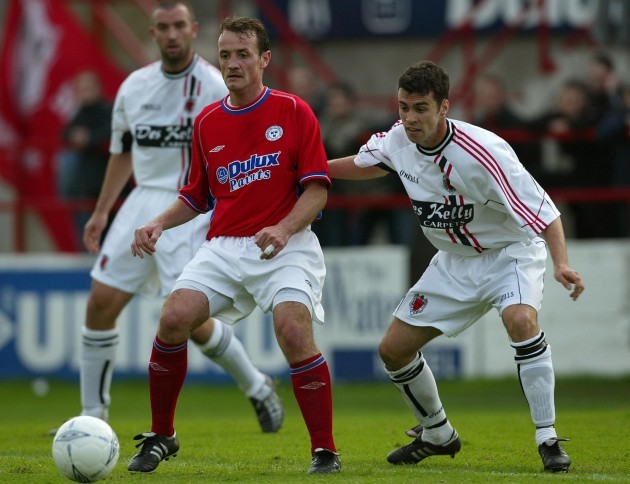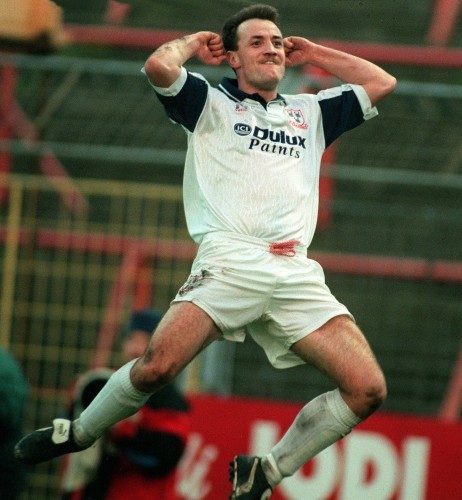THERE WAS A collective groan from the Cork City supporters in the queue for the turnstiles as we waited to enter the ground at Bishopstown for the top-of-the-table clash with Shamrock Rovers on 5 December, 1993.
The source of their exasperation wasn’t the delay in gaining access to the club’s new home as kick-off in such a vital game approached. Instead, it was a reaction to the confirmation from the stadium announcer that Stephen Geoghegan was included in the Shamrock Rovers starting line-up.
In the build-up to the game, rumours had circulated on Leeside that Geoghegan was an injury doubt. However, he was deemed to fit enough to play in another game during what was a breakout season for the striker, who only turned 23 earlier that year.
Eighteen months previously, Geoghegan was playing junior football with Valley Park United near where he grew up in Finglas on the northside of Dublin. Yet thanks to a haul of 23 league goals, he ended that 1993-94 season as the League of Ireland’s top goalscorer and PFAI Player of the Year, as Rovers won their first title in seven years.
“That was the season when I began to make a name for myself, I suppose,” Geoghegan recalls. “It was my second season with Rovers. The first one had only been okay. I scored a few goals but things started happening for me the year after that.
“It was a big jump, going from junior football to playing for Shamrock Rovers. All you can do in that situation is knuckle down, get on with it and see where it takes you. That’s exactly what I did. But did I think it would go as well as it did? No, definitely not.”
Although Geoghegan is mostly known for his spells with Shamrock Rovers and Shelbourne, his career in the League of Ireland began and ended in Louth. Having played his schoolboy football with Rivermount, he joined Drogheda United at the age of 18 when fellow Finglas native Synan Braddish was appointed manager for the 1988-89 season.
A former Ireland international who once had a spell with Liverpool, Braddish steered Drogheda to the First Division title in his first season in charge. Geoghegan spent three seasons at United Park and won another First Division medal in 1990-91 after the club had been unable to preserve their status in the top flight.
It was at Drogheda where Geoghegan began to accumulate a tally that at one stage elevated him to fifth place on the list of the League of Ireland’s all-time leading goalscorers, but he opted against commuting from Dublin for a fourth season with the club and instead spent a year hitting the net for Valley Park.
Geoghegan may have dropped out of the League of Ireland and seemingly into footballing obscurity, but he remained on the radar of the manager of one of the biggest clubs in the country. In January 1992, Ray Treacy took over at Shamrock Rovers with the aim of assembling a team capable of winning the club’s first league title since the famous four-in-a-row side of ’87.
Geoghegan explains: “A friend of mine was a relation of Tony Macken, who had gone in as Ray Treacy’s assistant there. He said to me one day that Treacy wanted me to go up. I wasn’t sure about it at first because I thought he was taking the piss out of me. But I went up and gave it a go. It all happened from there.”
During Treacy’s first season in charge, there were few signs of progress. Geoghegan managed eight goals and only a point separated Rovers from the relegation zone at the end of the campaign. Nevertheless, led from the front by the prolific Geoghegan, they were champions a year later after experiencing a dramatic upturn in fortunes.
It was a team that featured players of the calibre of Paul Osam, Gino Brazil, John Toal, Terry Eviston and Alan Byrne, but it was the lively poacher with 10 on his back who was the cause of most concern for the opposition. Even Jack Charlton was intrigued.
A fortnight after Rovers were crowned champions, Geoghegan was included in the Ireland squad that travelled to Tilburg to play the Netherlands in a warm-up game for USA ’94. Just two years since he played for Valley Park, Geoghegan was suddenly within touching distance of an international debut against Dennis Bergkamp, Frank Rijkaard, Marc Overmars and Ronald Koeman, with the World Cup just eight weeks away.
It seemed too good to be true, and ultimately it was. Charlton’s 4-5-1 formation left a narrow window of opportunity for strikers. Tommy Coyne scored the only goal in a victory over the Dutch, Owen Coyle came off the bench, while John Aldridge, Tony Cascarino and David Kelly were already certainties for the tournament.
“I didn’t get a chance to play but it was a great experience,” Geoghegan says. “Ronnie Whelan, Roy Keane, Paul McGrath; all the big guns were in the squad at the time. It would have been great to get a chance but even to be around lads like that was brilliant.”
It wasn’t just Jack Charlton who paid attention to Geoghegan’s exploits as the summer of 1994 approached. Naturally there was interest from elsewhere in the League of Ireland, but clubs across the Irish Sea were also being made aware of his ability in front of goal.
“I went over on trial to Charlton Athletic,” Geoghegan says. “It was for a reserve game against Tottenham at White Hart Lane and I had flown over. I was all ready to play. Then Keith Peacock, who was the manager of Charlton’s reserves, basically told me that they couldn’t play me because Ray Treacy had heard about it and he was putting a stop to it. I ended up having to fly home that evening.
“Another time I went over to Gillingham for a trial and did well. Mike Flanagan, who managed Waterford later on, was the manager at Gillingham and he wanted to sign me — but then he got the sack. There was talk of something at Celtic as well at one stage but nothing ever materialised.”
He adds: “I would have liked a chance to go over, just to see could I step up to the next level or whatever. I wouldn’t say it’s a regret — it would have happened if it was meant to — but it was disappointing that the chance never came for me.”
Despite Ray Treacy’s efforts, Geoghegan did depart Shamrock Rovers ahead of the start of the 1994-95 season. When they began their title defence, Hoops fans felt much differently about the man whose goals had catapulted them back to the summit of Irish football just a few months earlier. Geoghegan would soon become accustomed to a frosty reception when Rovers were the opposition, both from the stands and on the pitch.
“I loved my time at Rovers and I loved the fans,” he says. “But the offer I got from Shels was one I just couldn’t refuse. I got an awful lot of stick from the Rovers supporters over the years after that, but that was to be expected. You have to take the good with the bad.
“I remember a good few years later we were playing them in Tolka Park and Stephen McGuinness kicked me in the face and knocked my tooth out. I was like a lunatic about it. But I ended up scoring the winner, which was sweet,” he laughs.
Geoghegan would spend 10 seasons with Shelbourne and finished three of them as the league’s top goalscorer. Silverware was plentiful too, but the initial transition wasn’t smooth. As he adjusted to his new surroundings and dealt with some injury problems, the goals didn’t come so easily in his debut season in red.
Shels had to settle for third place in the Premier Division in 1994-95. In fact, Geoghegan had been at Tolka Park for six seasons by the time he won another league title. In the meantime, however, there was no shortage of success in the cups.
Geoghegan rediscovered his golden touch in 95-96 as Shels won the League Cup for the first time in their history at the expense of Sligo Rovers. The goals were flowing again and the mischievous Geoghegan grin reappeared beneath the unmistakable moustache. But the highlight of the season was still to come in the FAI Cup decider.
In May 1996, Shelbourne faced a St Patrick’s Athletic side managed by Brian Kerr, who were on the verge of a league-and-cup double having been undefeated since the previous December. When Alan Gough was sent off in the 18th minute at Lansdowne Road for handling the ball outside his box, Shels’ hopes of victory looked slim. Manager Damien Richardson hadn’t named a substitute goalkeeper on the bench.
After a long dispute on the touchline over who would take over in goal, Brian Flood was the reluctant volunteer. Geoghegan handed Gough’s gloves to the midfielder, who was left with the unenviable task of keeping the likes of Liam Buckley, Ricky O’Flaherty and Eddie Gormley at bay for over an hour.
Nevertheless, it took Pat’s until the 76th minute to capitalise on their opponents’ goalkeeping mishap. Gormley swung a free-kick in from the right, Flood attempted to punch it clear, the ball connected with Pat’s defender Dave Campbell and ended up in the net.
But with Geoghegan and Tony Sheridan leading the charge, Shels weren’t out of sight. After scoring a stunning goal against Sligo in the semi-final, Sheridan conjured up another moment of magic to equalise in the dying moments of the game.
In the replay at Dalymount Park, Campbell and Sheridan again swapped second-half goals, but this time Geoghegan made the difference. Just moments after Gough saved a Gormley penalty with 10 minutes remaining, Mark Rutherford broke at the other end and crossed for Geoghegan to finish brilliantly to seal Shels’ fifth FAI Cup.
“It was a brilliant feeling,” Geoghegan recalls. “That’s when things really kicked off for me at Shels. I’d say that was probably one of the great cup finals. To score the winner was special, especially for such a good team that we were.
“There were some exceptional players in that side but I’d have to say that Shero was in a class of his own. We had a great understanding with each other. It was a good bond. Pat Morley and myself did well together as well when he came to Shels — I think we got 31 goals between us in a season — but Tony was incredible.
“When he came back from Coventry he was unreal. It was a pleasure to play with him. Wes [Hoolahan] was a great lad as well when I played with him later on. People always ask me about Shero and Weso, and who was the better player. Weso has proven it at the highest level, in fairness to him, but I always say Tony was the better of the two.”
Sheridan was the best player Geoghegan says he ever played alongside, but the man he namechecks as probably his toughest opponent helped to deny that Shels side a third consecutive FAI Cup in 1998: “Deccie Daly, he was a dirty bastard but a great lad too. A hard man and a brilliant defender. We had some battles.”
Geoghegan scored again in the ’97 final as Shels punctured another double dream — Derry City’s on this occasion — but a Cork City side captained by Daly halted their run of FAI Cup dominance a year later when Derek Coughlan headed in the only goal of a Dalymount Park replay.
By then, Geoghegan had been back in contention for an international debut. Playing in the green jersey had been an ambition of his, although he would have settled for orange. It was for an infamous World Cup qualifier that took place 20 years ago this week that Geoghegan received his second Ireland senior call-up.
Injury concerns over Tony Cascarino and Keith O’Neill caused Mick McCarthy to turn to the Shelbourne striker, who travelled with the squad to Macedonia under the impression that he was likely to be required at some stage during the game. Cascarino and Jon Goodman were picked to start up front, but Geoghegan was ready to play a part.
Although Alan McLoughlin headed the visitors into an early lead, it turned out to be a memorable game for all the wrong reasons for Ireland. En route to their first ever victory in World Cup qualifying, Macedonia went 3-1 up — aided by a couple of dubious penalty decisions — and Ireland ended the game with 10 men following Jason McAteer’s kung fu demonstration. David Kelly’s late goal was a merely a consolation.
Geoghegan: “It was pretty clear beforehand that Keith O’Neill was injured but he declared himself fit anyway. I thought I was going to be one of the subs, but he was on the bench instead so I missed out.
“Mick McCarthy gave me the news about an hour before the game. Keith O’Neill went on for Tony Cascarino at half-time, if I remember right, but he had to come off again and David Kelly went on.
“Even Damien Richardson was told that I was actually going to play in the game. And then I wasn’t even named as a substitute. I was sitting on the bench but only as the 19th man, so I wasn’t able to get a chance.
“To be told at the last minute that I wouldn’t even be on the bench, it was a sickener. I was just gutted. But life goes on, I suppose. I can appreciate overall that it was another great experience. I still have the orange kit at home. I don’t think there’s too many of them around.”
Geoghegan did eventually taste FAI Cup success for a third time in 2000. Having previously prevented St Pat’s and Derry from winning the double, Shels achieved that feat themselves at the turn of the millennium. Six years after winning his first Premier Division medal, Geoghegan got his hands on another. Cork City were seen off in the title race and Bohs were beaten in the FAI Cup final. It was a family affair too.
“To do the double in the same team as Declan [his older brother] was fantastic,” Geoghegan says. “We played against each other a lot over the years when he was with Bohs and Monaghan, so it was nice to play with him and even nicer that we were successful.”
That Shels side had to wait longer than they should have to be crowned league champions, Geoghegan insists. In his estimation, the appointment of Dermot Keely as manager in 1998 was a key factor. A second title under Keely’s stewardship followed in 2002.
“We definitely should have won more leagues. We threw a few away over the years but then we ended up winning the double when Damien [Richardson] was let go. You’d have to think Dermot made a difference, considering the success there was then.
“He was a hard man and he made us work a lot harder,” says Geoghegan, who incurred Keely’s wrath when he returned from honeymoon in 2001 carrying a few more pounds than the manager deemed acceptable.
“Dermot wasn’t happy about that at all and he let me know fast enough. But he was a great character and brilliant to play for. We were playing better football under Damien but with Dermot we were more dogged. Everyone was working hard, he got the best out of us all and that’s how the double came along.”
When Keely moved on, Pat Fenlon took the reins. The League of Ireland switched to summer soccer in 2003 and Geoghegan opted to quit his job as a warehouse worker in order to focus full-time on football. He was about to turn 33 but, having been the club’s leading goalscorer yet again in the previous season, he was confident that he still had several more seasons to contribute to a successful Shelbourne team.
Fenlon disagreed. With Jason Byrne arriving from Bray Wanderers, the Shels boss had a reduced role in mind for Geoghegan. He managed four league goals in that season, Byrne hit 21, and Shels won the title with five points to spare over Bohemians. For Geoghegan, his fourth and final league medal represented a bittersweet triumph.
“I thought Pat let me down. He let me go and it just wasn’t the same after that,” Geoghegan says. “I was 33 at the time, I felt there was still a few years left in me. Pat didn’t think so. He said he wanted me as a squad player but he knew I wanted to play.
“We just had our differences and went our separate ways. It was a falling-out at the time, 100%. It’s water under the bridge now and we talk away, but it was a bit different when it happened. I was gutted. Absolutely gutted.”
Geoghegan moved on and joined Dundalk in the First Division. He scored the winner in his league debut against Sligo Rovers after committing to the club on a two-year contract. However, after the disappointing manner in which a decade at Shelbourne ended, his heart was no longer in it. When a familiar face was appointed Dundalk manager midway through the 2004 season, Geoghegan saw it as a sign that it was time to call it a day.
Geoghegan: “Jim Gannon took over at Dundalk and we hadn’t seen eye-to-eye when we were playing at Shels. He was gunning for me out of there so I just held my hands up and packed it in at that stage. That was the last of me in the League of Ireland.
“Do I have regrets about how it ended? I do, because I know I should have been still playing with Shels. I know I could have scored goals there for three more years. I think I could have done it until I was probably 36. I would have loved the chance to prove it, but that was that for me.”
Following a disappointing conclusion, life after the League of Ireland only brought more uncertainty for Geoghegan. His status as one of Irish football’s greatest goalscorers was of little value to him as he struggled to find work. Having devoted his life to football, he felt that the game gave him nothing back when he needed it most.
“It was very tough,” he says. “You don’t know what’s going to happen after football. It’s a sin that there’s nothing there for players when they come to the end of their careers. I didn’t make sure I had something to fall back on and it’s a regret. I’d advise players now to not do the same thing.
“In fairness to the PFAI [Professional Footballers' Association of Ireland], they’ve done a lot of different things to try and organise something for players, which is great. But the FAI need to look at it too. Wherever it’s possible, players should be kept in the game after they hang up the boots. It’s not as if we don’t need more coaches.”
Geoghegan thought he’d found a way back into a job in the League of Ireland in January 2007. Amid financial problems which saw the club demoted to the First Division, Geoghegan met Shelbourne owner Ollie Byrne with a view to taking over as manager following the resignation of Pat Fenlon, who had moved on to Derry City.
“I met Ollie on a Friday and we agreed terms,” Geoghegan explains. “I was to go down on the Saturday morning to sign the contract but, as it happened, poor Ollie took ill in the meantime and never recovered. He passed away a few months later. I went up to see him when he was in the hospice in Harold’s Cross and he was saying to me, ‘Geogho, don’t worry about it, we’ll organise players’ and all that.
“In his mind I still had the job, but the committee, some of them wanted me and others didn’t. It just fell apart from there and Dermot [Keely] came back to take the job again. That was a massive disappointment for me. I was looking for that little opening and it seemed like that was it. It would probably have been make-or-break. Unfortunately it broke me in the end.”
Geoghegan has had various stints as a manager and coach at local level. He’s currently in his second season in charge of Leinster Senior League side St Patrick’s CYFC. Now 46, he has made a positive impact in Ringsend according to those involved with the club.
Ideally, the role would provide a platform for him to pursue a manager’s job in the League of Ireland. However, being eligible for such a position now requires a coaching licence that Geoghegan doesn’t possess. Changing that comes at a substantial cost — €7,550 — which he’s unable to afford.
“With the price of doing your coaching badges, it’s crazy money,” says Geoghegan. “Being able to go down that route is not looking likely for me at the moment, but you’d never know. I’m just hoping to get back working so I can get myself back on my feet. That’s the plan. The football keeps me sane and keeps me ticking over. I’m looking for work and battling on. Something will fall into place for me soon, please God.”
As a man who rarely required a second opportunity during his playing career, Geoghegan is eager to make the most of any break that opens up for him. With no shortage of fond memories to reflect on, he remains hopeful that football can revive his fortunes and ensure that there are still some good days ahead in the game that once consumed him.
As for that top-of-the-table clash in Bishopstown back in 1993? Shamrock Rovers came from 2-0 down to secure a draw and a valuable point away to their main rivals in the title race.
The groans of the Cork City supporters in the queue for the turnstiles were justified. No prizes for guessing who scored the goal that kickstarted the comeback.
